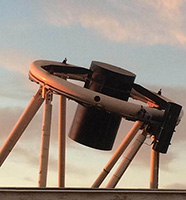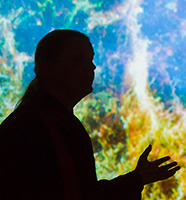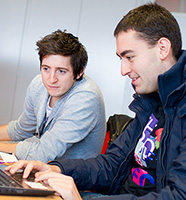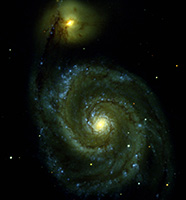About the Astrophysics Research Institute
Originating in 1992, the Astrophysics Research Institute now comprises over 90 staff and research students, making it one of the largest and most active astrophysics groups in the UK.
The primary strategic aim of the Astrophysics Research Institute (ARI) is to be a world leading centre of excellence in astrophysics, spanning research and knowledge exchange, teaching and learning, outreach, and public engagement.
Research interests of ARI staff include studies in star formation, stellar evolution, time-domain astrophysics, galaxy formation, cosmology, and the development of new instrumentation and technology (see Expertise).
The Liverpool Telescope is one of the main pieces of research infrastructure of the Institute and ARI staff have access to 30% of LT time for their own research programmes. In addition, we are presently developing a new facility designed for spectroscopic follow-up of time domain sources, called the New Robotic Telescope (planned “first light” in 2028), which will have a 4-metre segmented mirror making it the largest fully robotic telescope in the world. We have also led the development of a new state-of-the-art high-performance computing (HPC) facility at LJMU called Prospero, which consists of high-performance AMD-based CPU and Nvidia-based GPU nodes. Prospero is a workhorse for data analysis, machine learning applications, and large-scale gravity and fluid simulations.
Our staff and students also routinely use major international observational facilities, including the Hubble Space Telescope, the James WebSpace Telescope, ALMA, Gaia, MUSE on the VLT, and ZTF, and we are making significant contributions to the planning and commissioning of new facilities, including Euclid, WEAVE on the William Herschel Telescope, Rubin Observatory (formerly LSST), MOONS on the VLT, and WAVES. ARI staff and students working on large-scale simulations also regularly make use of the UK’s national DiRAC HPC facilities, as well as Europe’s PRACE network.
Examples of our knowledge exchange activities include partnerships with academic, government, and industry bodies through our ConservationAI work and via the LIVINNO and LIVDAT STFC-funded Centres for Doctoral Training (CDTs) in Data Intensive Science, the latter of which are coordinated jointly with colleagues at the Dept. of Physics at the University of Liverpool.
On the teaching and learning side, we offer high quality degrees at the undergraduate, postgraduate taught, and PhD levels in astrophysics and data science (see Courses).
We also have an enthusiastic and award-winning public engagement and outreach team led by the Schools’ Observatory.
What have we achieved?
We have performed exceptionally well in the latest survey of research quality in UK universities. The results of the Research Excellence Framework 2021 indicated that 97% of the ARI’s research outputs are world-leading or internationally excellent. The world-leading (4*) fraction was a remarkable 60%, which places the ARI in the top 5 of all UK Physics submissions by this metric. We had a similarly strong performance in our impact submission to REF2021 (led by our Schools’ Observatory and ConservationAI teams), where 100% of our impact was adjudged to be world-leading or internationally excellent.
ARI staff have been very successful in winning extremely competitive external research grants and prestigious fellowships. At present, for example, we have long-term fellows supported by the Royal Society through the University Research Fellowship and Dorothy Hodgkin Fellowship schemes, a UKRI Future Leaders Fellow, and two STFC Ernest Rutherford Fellows. In fact, we presently have the largest contingent of long-term astrophysics fellows anywhere in the UK! In addition, we have a long history of support from the STFC for funding postdoctoral and technical staff and we have also had several large European Research Council grants awarded.
ARI staff and students publish their research in top international, peer-reviewed journals such as Nature, the Astrophysical Journal, Monthly Notices of the Royal Astronomical Society, Astronomy and Astrophysics, and so on. Between 2020 and 2023, our staff and students have published over 700 refereed articles, or roughly one paper every two days! And these papers are cited three times more frequently than the typical astrophysics paper.
The ARI is committed to promoting and embodying Equality, Diversity, and Inclusivity. We hold Institute of Physics Juno Practitioner status and the Athena SWAN bronze award. Please take a look at our EDI pages, where you will find information on a wide range of ongoing initiatives and activities along with University policies and procedures.






